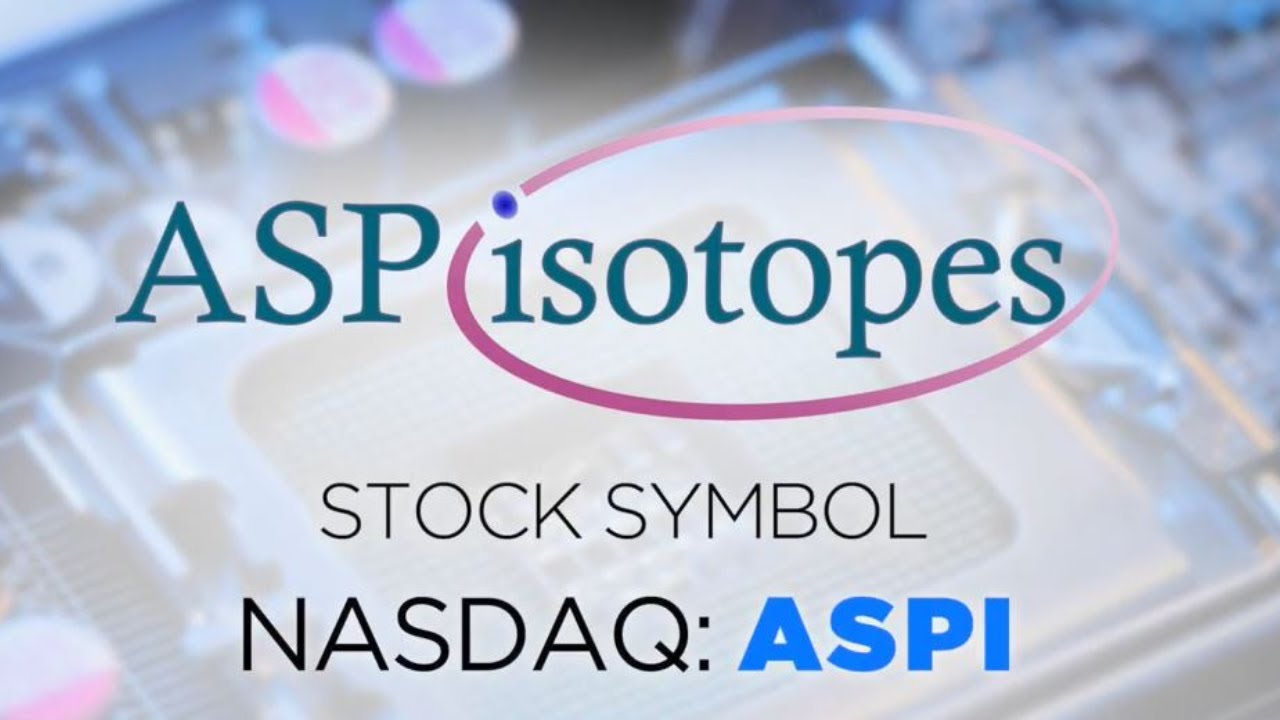ASP Isotopes Stock Surges After Inking $9 Million Isotope Supply Contract With US Client ($ASPI)
ASP Isotopes, Inc. (NasdaqCM: ASPI) stock surged after announcing a $9 million isotope supply contract with its first US customer. At $1.23 today, the gains since June have reached 284%. And that’s taking into account profit taking when prices were higher. ASPI stock touched $1.78 earlier this month, an over 456% increase worthy of taking some gains off the table. The share price increase was and is warranted. As noted, ASPI announced making its US market entrance on a deal that will add an expected $900,000 to its revenues this quarter. (*share price on 8/25/23, Yahoo! Finance, $1.23 at 3:38 PM EST)
Its overseas market debut is a milestone reached. In fact, for South Africa-based ASP Isotopes, it’s a foot through a massive market door that could lead to other high-dollar US-based contracts. It should. Isotopes are in high demand from multiple sectors. From an investor’s, there’s plenty to like, including ASPI having the means to serve that demand, leveraging over two decades of isotope market experience to sell into a red-hot market where pricing power is decidedly on the supplier’s side. Also contributing to the ASPI value proposition is their having just 37.39 million shares O/S, with roughly 45% of them tightly held in insider’s hands.
While that cap table contributes to strengthening a tailwind to the ongoing rally, the momentum behind the move can be more attributed to ASPI growing faster than many expected.

ASP Isotopes Growing Bigger Faster
That’s evidenced by ASPI providing bullish guidance that sales in the US and abroad are expected to maintain their steepening trajectory trend. They noted in an update that they are receiving considerable interest from US and non-US customers to supply specific isotopes needed by end-market users in the healthcare, technology, and green energy sectors. Interest is important. Signing deals and being able to deliver matters more. ASPI says it will do the latter from a production infrastructure continuing to strengthen through the buildout of its facilities. That work is intending to facilitate ASPI to scale its operations more quickly. If so, and there’s no reason to expect otherwise, completing that mission will do more than drive revenues higher; it will position ASPI to capitalize on its intrinsic and inherent strengths to grow faster in the isotope production sector.
For those unfamiliar with isotopes and why global demand from different sectors is steadily rising, here’s a quick overview: Isotopes are like identical twins or triplets, very similar in most aspects, except for a few subtle differences. Another definition, this time a more scientific one, calls isotopes two or more atoms of the same chemical element with the same number of protons and electrons but slightly different numbers of neutrons. Here’s where it gets technical. They are mixed together in nature, just like M&M chocolate candies: same composition, taste, and size – just different colors. Needing to be sorted, the isotope separation process puts them into fractions of precisely the same types. As one would expect, it’s a challenging and expensive process because isotopes are so similar, with only minor weight differences being the distinguishing factor. ASPI is up to that challenge.
ASP Isotopes leverages two decades of experience as an advanced materials company to develop technology and processes to produce isotopes for multiple industries. That’s made possible by the proprietary technology empowering its Aerodynamic Separation Process (“ASP technology”), contributing to successful production, distribution, marketing, and sale of the ready-for-client isotopes. As noted, ASPI’s work is highly specialized and client-specific, currently targeting revenue-generating opportunities from producing and commercializing highly enriched isotopes for the healthcare and technology industries. While those markets are its current focus, ASPI plans to capitalize on additional market potentials, including those from the green energy sector, with all opportunities served from its two isotope enrichment facilities in Pretoria, South Africa.
One of its facilities is dedicated to enriching isotopes of elements with a low atomic mass (light isotopes), leading toward the initial production of Carbon-14. The second, larger facility will focus on producing various other isotopes to serve the growing client demand for isotopes like Silicon-28, which can be used for quantum computing. Other in-demand isotopes include Molybdenum-100, Molybdenum-98, Zinc-68, Ytterbium-176, and Nickel-64 for new, emerging healthcare applications. To monetize its green energy interests, ASPI plans to produce Chlorine-37, Lithium-6, and Uranium-235 for applications relevant to that sector. Meeting this diverse demand wasn’t an afterthought; instead, it’s an intentional result of ASPI’s ASP Technology, which has proven ideal for enriching low and heavy atomic mass molecules. Both plants are expected to enter commercial production from late 2023 to early 2024, which ASPI expects can generate considerable free cash flow.

Targeting A Billion Dollar Isotopes Market
The expected revenue surge won’t be coincidental. Instead, it’s an intended result of ASPI’s competitive advantages that allow it to effectively compete for the lion’s share of a market opportunity estimated well into the billions. That accounts for the demand from the target markets mentioned and new ones inherent to its plans to serve isotope needs in the Nuclear Medicine and Green Nuclear Energy space. ASPI is well-prepared to reach these markets, and its production technology will likely attract plenty of business.
Again, not a coincidence. Clients are attracted to ASPI’s innovative isotope enrichment technology, which is cost-effective and has modular scalability. That benefits ASPI. But they are also environmentally friendly and unique compared to competing separation facilities. That benefits clients. In other words, with ASPI’s isotope enrichment plants utilizing natural isotopes and accelerator-based production that generate zero overall waste, ASPI offers a win-win proposition. There’s another element supporting ASPI’s timeliness to its opportunities.
An urgent need exists to maintain a reliable global supply of various isotopes. Recent geopolitical events have made governments and companies reassess their reliance on Russia to produce isotopes. That’s wise. Russia’s production share of the global medical isotope market is 22%, and China and Russia together comprised 57% of the world’s Uranium Enrichment capacity in 2020. Dependence on those suppliers is in jeopardy of becoming even more significant as 8 of the world’s 9 major reactors producing medical isotopes are expected to shutter over the next 15 years, adding to an already wide gap in global supply for Mo-99 and other isotopes.
Clients that understand the situation are doing what they should- sourcing reliable supplies. And ASPI may already be benefiting from the scramble to do so. An update indicated at least two more supply agreements for crucial isotopes could be in its queue. Securing these contracts could be a significant near-term achievement for ASPI, bringing more revenue streams to help push ASPI closer to positive cash flow. Longer-term guidance shows ASPI expects to sign additional supply contracts for other isotopes from 2025-2028, with increased production supported by planned facility builds and upgrades. In addition to the two mentioned, a third enrichment facility could be completed by the end of 2024. That one is being designed with enhanced energy-saving integrations to facilitate revenues falling faster to its bottom line.
Know this, too. While most people have not heard of isotopes or what they do, demand is real and growing. Carbon-14 is already serving user demand in the pharma and agro-chem sectors. Additionally, two Molybdenum isotopes will be available in late 2023 for nuclear medicine, adding to the value from its silicon-28, under construction for quantum computing uses. Other isotopes in ASPI’s research and development pipeline include variants of Germanium, Ytterbium, Nickel, Xenon, Chlorine, Lithium, Zinc, and Uranium. Each brings tremendous potential for ASPI to exploit diverse revenue-generating opportunities.
ASP Isotopes Utilizes Innovative Separation Processes
Attribute that to ASPI’s unique approach and technological processes to making isotopes. Unlike conventional methods for isotope separation, such as gas centrifugation, which are costly and often require substantial capital investment, ASPI’s separation process utilizes a stationary cylinder wall while gas spins rapidly due to pressure application and flow direction. The absence of moving metal components leads to reduced expenses and simpler operations. It also mitigates excess capital expenditures and lessens maintenance costs.
That’s a key differentiator and advantage expected to help increase ASPI revenue run rates during the remainder of this year. So should business generated from its Carbon-14 isotopes. It’s already expected to contribute significantly to ASPI growth through in-place multi-year supply agreements expected to generate upwards of $2.5M. Applications for Carbon-14 are plenty, especially in the science space, appealing to that sector because of its relatively harmless emission and long-lasting half-life. Commercial Carbon-14 production is expected to commence by the end of this year. Additional milestones in the crosshairs include targeting isotope market opportunities from the SPECT scan imaging market, with a combined global revenue-generating potential from that market, a $4.61 billion opportunity. Notably, that number could grow further as specialized isotopes pave the way for new, inventive uses.
Here’s something else to consider when appraising ASPI. Concerns are real about 95-98% of Molybdenum-99 being produced using highly enriched uranium targets. So is the matter that 8 of the world’s 9 major reactors will close in the next 15 years. That exposes something vital to ASPI’s growth trajectory…they are in the right markets at the right time. Moreover, they have the right products to serve and even more in development.
Helping To Fill A Massive Global Isotope Supply Gap
That’s excellent news for countries, including the United States. It relies on imports for 95% of its uranium and 81% of its enrichment from foreign sources, exemplifying the potentially massive revenue-generating opportunity from that market potential alone by being a “friendly” and reliable isotope supplier. Putting more revenues on target, other countries are focusing on raising nuclear power capabilities. For instance, the UK aims to expand nuclear power from 15% to 25% by constructing 8 new plants by 2050. India and France have plans to build 10 and 6 new reactors, respectively, and Japan aims to produce 20-22% of its electricity from nuclear sources by 2030. China currently has 38 operational reactors and 19 under construction, with further plans to produce 70 GW of power by 2025.
Those figures contribute to concerns that many are behind the curve to protect national interests. Worse, those not taking the matter seriously could face supply chain disruptions, considering that Russia, which is in a prolonged war, contributes 35% of the world’s enriched uranium. For the US, its need to import exposes a potential supply chain catastrophe should geopolitical conflicts continue to draw sides.
Ironically, microcap ASPI could be one of the companies to change the isotope production and supply landscape. In fact, its proprietary technology and research to enhance isotopes of varying atomic masses can do more than enable isotope production for multiple industries and applications; it could make it a market leader. That could happen sooner than later, recognizing that geopolitical factors and favorable market conditions support rapid expansion driven by an urgent need for reliable isotope sources.
Considering ASPI’s operational performance and two enrichment facilities near completion with a third to follow, they check the right boxes to help address a global need. More than checking boxes, ASPI is better positioned than at any time in its history to have a breakout performance in the back half of this year. That starts with the nearly one million dollars expected to be posted to its books this quarter. Hence, the over 284% increase since June may be the precursor to more appreciable gains. That sentiment is warranted, justified by increasing revenues, expected contracts, and an ability to do things differently, which is ASPI’s primary advantage.
Combined, the pullback from its August high of $1.78 looks like an opportunity, not a deterrent. Consolidation is healthy. And with ASPI having a restorative one at the $1.23 range, a break higher on expected updates could be the path of least resistance.
Disclaimers: Shore Thing Media, LLC. (STM) is responsible for the production and distribution of this content. STM is not operated by a licensed broker, a dealer, or a registered investment adviser. It should be expressly understood that under no circumstances does any information published herein represent a recommendation to buy or sell a security. Our reports/releases are a commercial advertisement and are for general information purposes ONLY. We are engaged in the business of marketing and advertising companies for monetary compensation. Never invest in any stock featured on our site or emails unless you can afford to lose your entire investment. The information made available by STM is not intended to be, nor does it constitute, investment advice or recommendations. The contributors may buy and sell securities before and after any particular article, report and publication. In no event shall STM be liable to any member, guest or third party for any damages of any kind arising out of the use of any content or other material published or made available by STM, including, without limitation, any investment losses, lost profits, lost opportunity, special, incidental, indirect, consequential or punitive damages. Past performance is a poor indicator of future performance. The information in this video, article, and in its related newsletters, is not intended to be, nor does it constitute, investment advice or recommendations. STM strongly urges you conduct a complete and independent investigation of the respective companies and consideration of all pertinent risks. Readers are advised to review SEC periodic reports: Forms 10-Q, 10K, Form 8-K, insider reports, Forms 3, 4, 5 Schedule 13D. For some content, STM, its authors, contributors, or its agents, may be compensated for preparing research, video graphics, and editorial content. Shore Thing Media, LLC. has been compensated up to three-thousand-five-hundred-dollars cash via wire transfer by a third party to produce and syndicate content for ASP Isotopes Inc. for a period oftwo weeks ending on September 2, 2023. As part of that content, readers, subscribers, and website viewers, are expected to read the full disclaimers and financial disclosures statement that can be found on our website. Contributors reserve the right, but are not obligated to, submit articles for fact-checking prior to publication. Contributors are under no obligation to accept revisions when not factually supported. Furthermore, because contributors are compensated, readers and viewers of this content should always assume that content provided shows only the positive side of companies, and rarely, if ever, highlights the risks associated with investment. Thus, readers and viewers should accept the content as an advertorial that highlights only the best features of a company. Never take opinion, articles presented, or content provided as a sole reason to invest in any featured company. Investors must always perform their own due diligence prior to investing in any publicly traded company and understand the risks involved, including losing their entire investment. The Private Securities Litigation Reform Act of 1995 provides investors a safe harbor in regard to forward-looking statements. Any statements that express or involve discussions with respect to predictions, expectations, beliefs, plans, projections, objectives, goals, assumptions or future events or performance are not statements of historical fact may be forward looking statements. Forward looking statements are based on expectations, estimates, and projections at the time the statements are made that involve a number of risks and uncertainties which could cause actual results or events to differ materially from those presently anticipated. Forward looking statements in this action may be identified through use of words such as projects, foresee, expects, will, anticipates, estimates, believes, understands, or that by statements indicating certain actions & quote; may, could, or might occur. Understand there is no guarantee past performance will be indicative of future results. Investing in micro-cap and growth securities is highly speculative and carries an extremely high degree of risk. It is possible that an investors investment may be lost or impaired due to the speculative nature of the companies profiled.
Media Contact
Company Name: STM, LLC.
Contact Person: Michael Thomas
Email: [email protected]
Country: United States
Website: https://primetimeprofiles.com/



